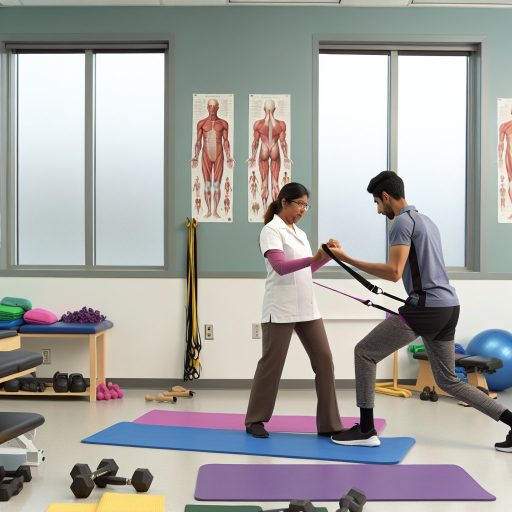Introduction to Kinesiology
Definition of Kinesiology
Kinesiology is the study of body movement.
It blends science and practical application.
This field examines physical activity and its impact on health.
Professionals apply principles of biomechanics, anatomy, and physiology.
They focus on optimizing human performance and preventing injury.
Core Concepts of Kinesiology
The core concepts center around movement and its effects.
Kinesiology emphasizes the relationship between body systems.
It explores how these systems interact during physical activity.
Moreover, it includes the study of motor skills and learning.
Professionals utilize these concepts in various health settings.
Importance in Health Care
Kinesiology plays a crucial role in health care.
It aids in rehabilitation and physical therapy.
Consequently, it enhances recovery after injuries.
Furthermore, it promotes overall wellness and physical fitness.
Kinesiologists develop tailored exercise programs for patients.
These programs aim to improve strength, flexibility, and endurance.
Applications in Different Settings
Kinesiologists work in diverse environments.
These include hospitals, clinics, and fitness centers.
Schools also employ kinesiologists for sports programs.
Additionally, they contribute to research and education.
Their expertise advances understanding of human movement.
Future Trends in Kinesiology
The field of kinesiology is evolving rapidly.
Technology increasingly influences practices and interventions.
Wearable devices monitor physical activity in real time.
Additionally, virtual and augmented reality offer new training methods.
Unlock Your Career Potential
Visualize a clear path to success with our tailored Career Consulting service. Personalized insights in just 1-3 days.
Get StartedPioneering research continues to explore the limits of human potential.
Historical Development of Kinesiology in Health Care
Early Foundations
The roots of kinesiology date back to ancient civilizations.
Egyptians and Greeks emphasized the importance of physical movement.
They recognized exercise as a means to promote health and well-being.
Furthermore, philosophers like Aristotle explored movement’s scientific aspects.
20th Century Advancements
The 20th century marked significant advancements in kinesiology.
Researchers began studying the human body’s movements systematically.
In the 1950s, the establishment of formal education programs emerged.
Universities started offering degrees in kinesiology and related fields.
Integration into Health Care
In recent decades, kinesiology has become vital in health care.
Health professionals now use kinesiology principles for rehabilitation.
Furthermore, athletes utilize kinesiology for performance enhancement.
Kinesiologists collaborate with physiotherapists and other specialists.
The Role of Technology
Technological advancements have transformed kinesiology practice.
Wearable devices enable real-time monitoring of physical activity.
Data analytics provide insights into movement patterns and health outcomes.
This technology aids in creating personalized health plans.
Current Trends
Today, kinesiology continues to evolve and adapt.
Integrative health approaches combine kinesiology with other disciplines.
Moreover, research supports its effectiveness in diverse populations.
Practitioners focus on prevention, wellness, and quality of life.
Future Directions
The future of kinesiology in health care appears promising.
Emerging research may uncover new therapeutic applications.
As awareness grows, kinesiology’s role will likely expand further.
Continued education and research are essential for progress.
The Role of Kinesiology in Preventative Health and Wellness
Understanding Kinesiology
Kinesiology focuses on human movement as a key to health.
This discipline studies biomechanics and exercise physiology.
Moreover, it considers psychological aspects of physical activity.
Benefits of Kinesiology in Preventative Health
Kinesiology promotes overall wellness through movement.
Its practices encourage healthier lifestyle choices.
Individuals gain improved physical fitness and performance.
Impact on Chronic Disease Prevention
Kinesiologists help clients manage chronic illnesses effectively.
They design exercise programs tailored to individual needs.
Additionally, they educate on the importance of regular activity.
Community Wellness Programs
Kinesiology contributes to community health initiatives.
These programs focus on physical activity education.
They foster social connections that improve mental well-being.
Integration with Healthcare Systems
Kinesiologists collaborate with healthcare professionals.
This teamwork enhances patient care within healthcare systems.
They provide valuable insights into rehabilitation methods.
Future Directions in Kinesiology
The field of kinesiology continues to evolve rapidly.
Emerging technologies improve assessment and treatment methodologies.
Research is vital for advancing knowledge in preventative health.
You Might Also Like: Advanced Technologies Used by Modern Podiatrists
Kinesiologists’ Impact on Rehabilitation and Injury Recovery
Role of Kinesiologists
Kinesiologists play a crucial role in rehabilitation.
They utilize movement-based therapies to enhance recovery.
Moreover, they assess functional abilities in patients.
This assessment helps in developing personalized treatment plans.
Consequently, their expertise fosters better patient outcomes.
Techniques Used in Therapy
Kinesiologists employ various techniques in their practice.
These include exercise therapy, manual therapy, and electrotherapy.
Exercise therapy focuses on restoring movement and strength.
Manual therapy involves hands-on techniques to relieve pain.
Electrotherapy reduces inflammation and promotes healing.
Evidence-Based Approach
Kinesiologists rely on an evidence-based approach.
This ensures that patients receive the most effective treatments.
They stay updated on the latest research and techniques.
Furthermore, they collaborate with other healthcare professionals.
This collaboration optimizes the patient’s recovery process.
Impact on Patient Motivation
Patient motivation is essential for recovery success.
Kinesiologists encourage active participation in rehabilitation.
They set achievable goals to boost patient confidence.
In addition, they provide ongoing support and education.
This holistic approach promotes a positive mindset in patients.
Real-Life Success Stories
Real-life success stories illustrate their effectiveness.
For instance, Sarah initially struggled with knee pain.
Through a tailored exercise program, she regained mobility.
David’s recovery from a sports injury was swift and efficient.
Thanks to kinesiologists, he returned to his favorite sport.
Uncover the Details: Dental Specialties: Exploring Career Options in Canada
Specializations within Kinesiology: An Overview
Exercise Science
Exercise science focuses on the study of physical activity.
This specialization looks at how exercise affects the body.
Professionals in this field design fitness programs for various populations.
They often work in clinical, corporate, or community settings.
Biomechanics
Biomechanics examines the mechanical aspects of human movement.
It combines physics and biology to understand motion.
Experts analyze body movements to improve performance and reduce injuries.
This field is vital for developing effective rehabilitation techniques.
Rehabilitation Sciences
Rehabilitation sciences focus on helping individuals recover from injuries.
This specialization includes physical therapy and occupational therapy.
Therapists evaluate patients’ needs and develop personalized recovery plans.
They use various techniques to restore function and mobility.
Sports Management
Sports management encompasses the business side of athletic programs.
This includes marketing, administration, and event management.
Professionals often work with teams, sports organizations, and sponsors.
They help promote athletic events and support athletes’ careers.
Health and Wellness Coaching
Health and wellness coaching promotes healthy lifestyle choices.
Coaches guide individuals in creating sustainable habits.
They provide support in nutrition, exercise, and mental health.
This specialization focuses on enhancing overall well-being.
Kinesiotherapy
Kinesiotherapy uses movement to help patients recover physical function.
It emphasizes the importance of therapeutic exercise.
Kinesiotherapists work alongside other healthcare professionals.
They develop targeted exercise programs to facilitate recovery.
Delve into the Subject: Kinesiologists’ Role in Enhancing Athletic Performance

Interdisciplinary Collaboration: Kinesiology and Other Health Professions
The Role of Kinesiology in Health Care Teams
Kinesiology offers valuable insights to health care teams.
It focuses on human movement and rehabilitation.
Moreover, kinesiologists improve patient outcomes through active interventions.
They collaborate with physical therapists regularly.
This collaboration enhances rehabilitation programs.
Additionally, kinesiologists work closely with occupational therapists.
This partnership optimizes functional mobility for patients.
By joining forces, they create comprehensive treatment plans.
Integrating Kinesiology with Nutrition and Dietetics
Kinesiologists and dietitians share a common goal: health improvement.
They assess patient needs together for holistic care.
Moreover, kinesiologists provide exercise recommendations aligned with dietary plans.
This teamwork fosters better weight management strategies.
Consequently, they influence overall health positively.
Collaboration with Mental Health Professionals
Mental health professionals benefit from kinesiology’s insights.
Physical activity can significantly enhance mental well-being.
Collaborative programs may include exercise as part of therapy.
Kinesiologists contribute techniques to improve mood and resilience.
These programs promote emotional stability and coping mechanisms.
Educational and Research Partnerships
Kinesiologists often partner with educational institutions.
They engage in research that advances health care practices.
Interdisciplinary studies yield innovative solutions for health issues.
Such partnerships foster learning and knowledge-sharing opportunities.
Ultimately, they improve health literacy among professionals.
Collaboration Among Health Professionals
Collaboration among health professionals is vital.
Teamwork enhances the quality of care for patients.
Integrating kinesiology with various disciplines propels health advancements.
Every profession offers unique strengths to the team.
Through collaboration, they achieve greater health outcomes.
You Might Also Like: How Chiropractors Treat Common Sports Injuries
Evidence-Based Practices in Kinesiology and Their Applications
Introduction to Evidence-Based Kinesiology
Evidence-based kinesiology emphasizes the use of research to inform practice.
It integrates clinical expertise, patient values, and the best research evidence.
Practitioners aim to achieve optimal results for clients and patients.
Research Methodologies in Kinesiology
Various research methodologies underpin evidence-based practices.
Quantitative methods often include randomized controlled trials.
Qualitative methods focus on understanding patient experiences and outcomes.
Both methodologies contribute essential insights for practitioners.
Application of Evidence-Based Practices
Implementing evidence-based practices occurs in several domains.
In rehabilitation, kinesiology enhances recovery from injuries.
In health promotion, it supports wellness and fitness initiatives.
Case Studies and Real-World Examples
Case studies illustrate successful applications of kinesiology.
An example includes a sports injury recovery program at Fitness First.
This program utilized evidence-based techniques to improve patient outcomes.
Challenges in Evidence-Based Kinesiology
Despite its advantages, challenges exist in applying evidence-based practices.
Limited access to research can hinder implementation in clinical settings.
Additionally, resistance from practitioners can affect adoption rates.
Future Directions for Evidence-Based Kinesiology
The future of kinesiology lies in expanding research and education.
Developing interdisciplinary collaboration can strengthen evidence-based practices.
Furthermore, increasing community awareness can drive demand for these practices.
Future Trends in Kinesiology: Technology and Innovative Approaches
Integration of Technology in Kinesiology
Technology is transforming the field of kinesiology rapidly.
Wearable devices now track physical activity and health metrics.
These devices provide valuable data for personalized health care.
Furthermore, mobile applications enhance engagement in rehabilitation programs.
Telehealth services make kinesiology more accessible to patients.
Innovative Rehabilitation Techniques
New methods are emerging in rehabilitation practices for patients.
Virtual reality is gaining traction for physical therapy sessions.
This technology immerses patients in motivating environments.
Moreover, robotic-assisted therapy is becoming more common.
Such methods improve patient outcomes significantly.
Personalized Exercise Programs
Tailoring exercise programs to individual needs is essential.
Advanced algorithms analyze data to recommend specific routines.
This personalization enhances effectiveness and adherence.
Additionally, fitness assessments guide the development of these programs.
As a result, clients experience better overall progress.
Research and Development in Kinesiology
Ongoing research is critical for the advancement of kinesiology.
Studies explore the impacts of physical activity on chronic conditions.
New findings guide evidence-based practices for practitioners.
Furthermore, partnerships between universities and health organizations promote innovation.
These collaborations advance the science and practice of kinesiology.
Additional Resources
Regulated health professions | ontario.ca
Exploring research team members’ and trial participants’ perceptions …




